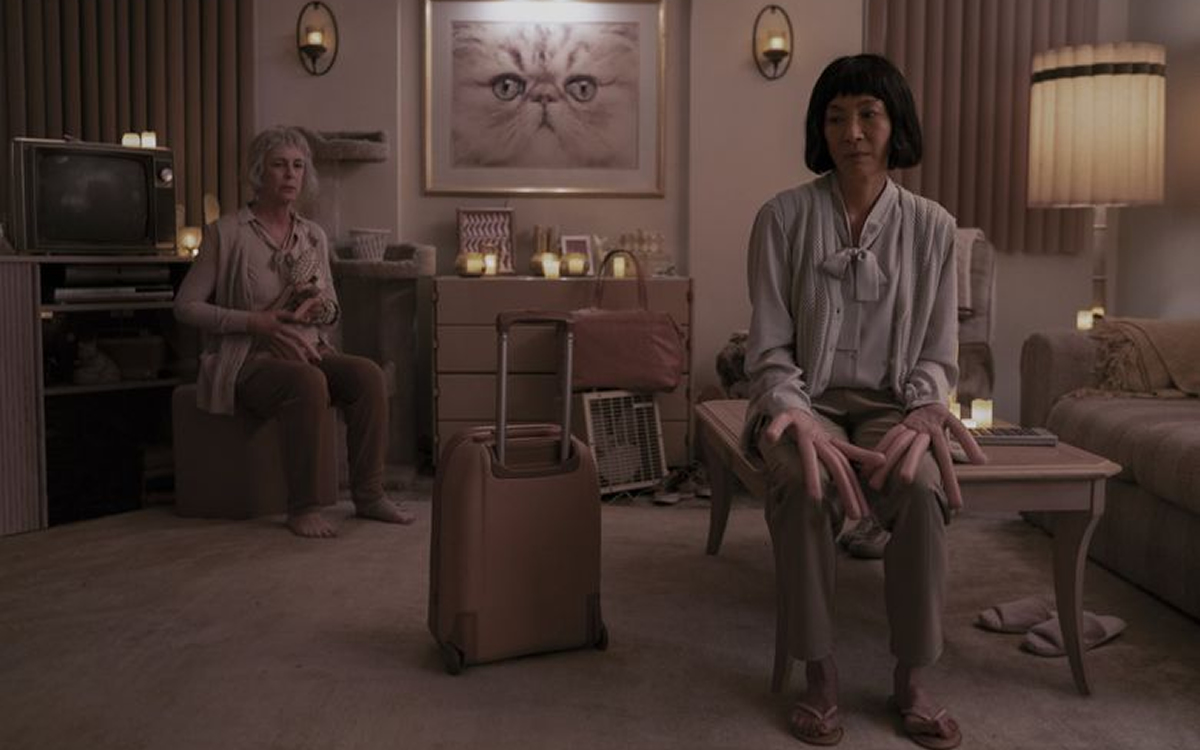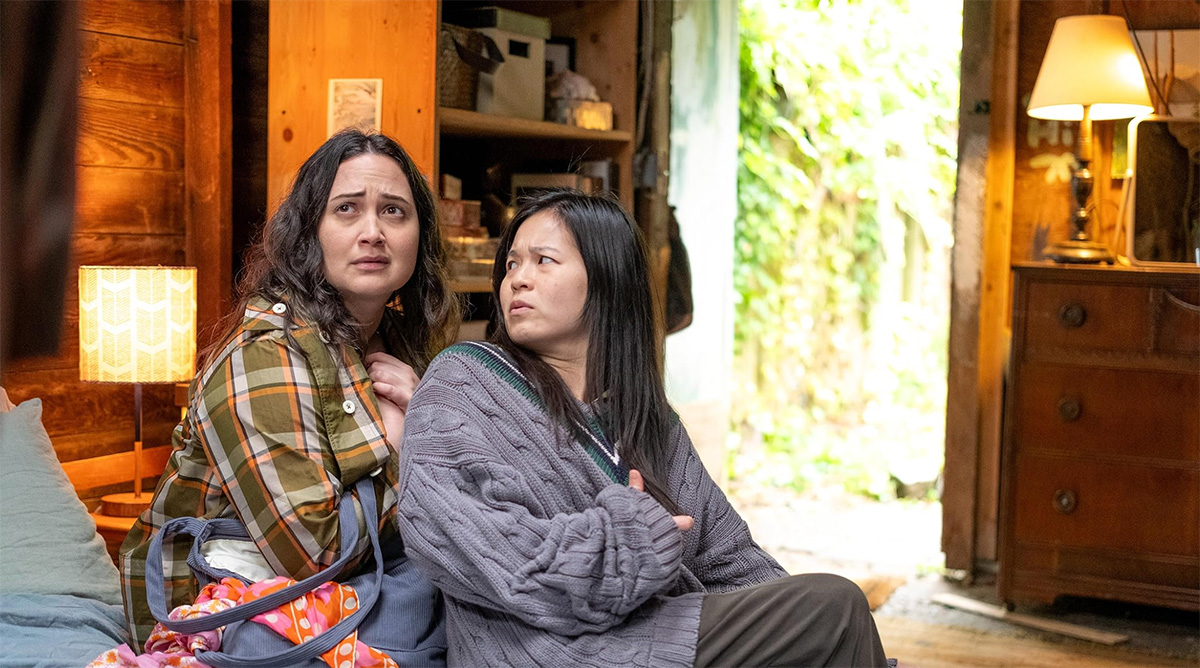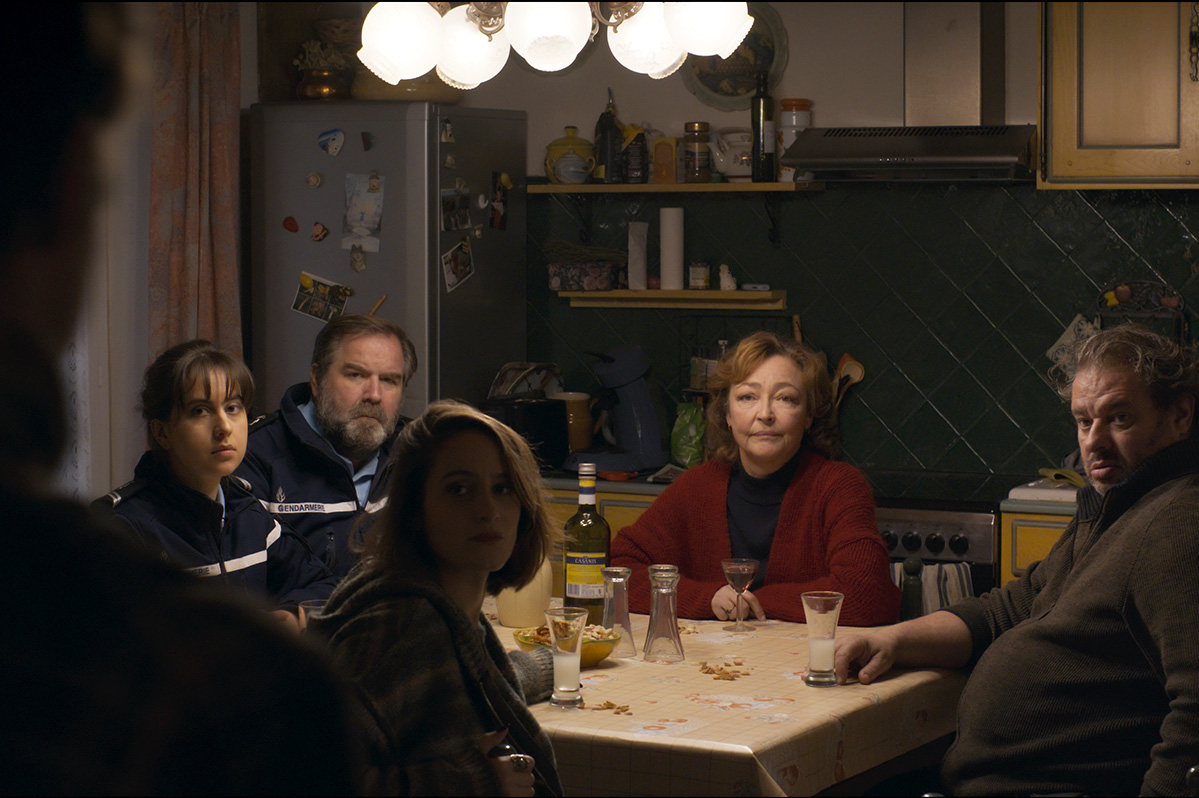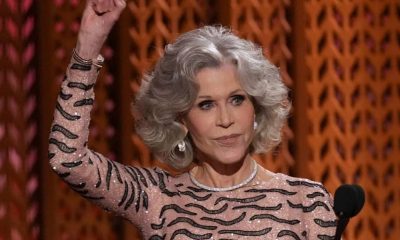Movies
‘Everything’ lands queer endorsement as movie of the year
Dorian Awards add to momentum for breakout film as Oscars near

For Oscar handicappers – or anyone else who loves movies and enjoys playing the yearly game of picking favorites and predicting winners during Hollywood’s glitzy awards season – last weekend’s presentation of the Screen Actors Guild Awards was a crucial event.
As the last “big” awards ceremony before Academy Award night (which takes place this year on March 12), the SAG Awards’ film category winners are often seen as a clear indicator of which films and performers have the momentum to win there, too. It’s not surprising they should be seen as significant, but this year, thanks to some history-making wins (including firsts for Asian-American talent and a single movie’s sweep of all but two of the film categories), there was even more reason to pay attention.
SAG was not the only organization to bestow its film awards last week, however. Though they received less fanfare, the 14th Annual Dorian Awards – announced on Feb. 23 by GALECA, the Society of LGBTQ Entertainment Critics – offered a slate of winners that reflected a queer eye on the films of 2022; and while they might not be as much a barometer for the tastes and attitudes of the industry insiders who vote for the big film awards, it should be noted that its choices align surprisingly often with those of SAG and the rest of mainstream Hollywood.
That’s partly because, although they do include a handful of LGBTQ-specific categories, the Dorians don’t just honor queer films. GALECA’s voters – a group of more than 400 professional queer entertainment critics, journalists, and media icons – look at the same movies as their straight colleagues; they present the Dorians (named as a nod to iconic queer writer Oscar Wilde and his most famous literary creation) as a way “to remind bigots, bullies and our own communities that the world often looks to the Q+ eye for unique and powerful entertainment,” and to ensure that a queer perspective is represented amid Hollywood’s yearly bestowal of honors. While there have been notable divergences, such as the occasional queer title like “Carol” or “Call Me By Your Name” supplanting their more hetero-friendly competitors for Film of the Year, recent Dorian honors have tended more to mirror the mainstream consensus than defy it.
This year is no exception. “Everything Everywhere All at Once,” the genre-splicing serio-comic sci-fi sleeper whose jaw-dropping sweep at the SAG show has made a similar triumph at the Oscars feel all but inevitable, also scored a lion’s share of honors from the Dorians, winning in seven of its nine nominated categories – even achieving the triple feat of being chosen as Best Film, Best LGBTQ Film and Most Visually Striking Film. For Lead Film Performance – all nominees, regardless of gender, vie for a single award in the each of the two acting categories – Yeoh, long embraced by queer fans, edged out not only Blanchett but favored male competitors like SAG winner Brendan Fraser and Golden Globe winners Colin Farrell and Austin Butler, while co-star Ke Huy Quan continued his inspiring victory lap by being chosen for Supporting Film Performance. Rounding out their movie’s tally, filmmakers Daniel Kwan and Daniel Scheinert won in both the Director and Screenplay categories. As a bonus, while technically awarded for “EEAAO,” Yeoh was also the winner of the Wilde Artist Award, a special Dorian given yearly “to a truly groundbreaking force in film, theater and/or television,” and fellow cast member Stephanie Hsu was named as Rising Star of the Year – honors almost certainly fueled by their work in “EEAAO.”
In other categories:
The UK import “Aftersun,” Charlotte Wells’ thoughtful father-daughter tearjerker starring Paul Mescal, which also is also nominated for Best Picture and Best Actor Oscars, was awarded the Dorian for Best “Unsung” Film.
“All the Beauty and the Bloodshed,” director Laura Poitras’ searing documentary about famed bisexual photographer Nan Goldin and her mission to shame the Sackler Big Pharma dynasty for profiteering on America’s opioid crisis, took both Best Documentary and Best LGBTQ Documentary; it’s also Oscar-nominated as Best Feature Documentary, the only queer-related doc to have made the cut there.
In the Best Animated Film category, the Dorians went against the tide by choosing “Marcel the Shell with Shoes On,” the charming and deceptively absurd stop-motion “mockumentary” adapted from a widely popular series of YouTube shorts, over “Guillermo Del Toro’s Pinocchio.” Both films are competing at the Oscars, as well.
For Best Non-English Language Film, the Dorians did what the Oscars cannot by picking “RRR” – the epic Telugu-language musical adventure fantasy about two South Indian rebels fighting to push British colonials from their homeland in the 1920s, rendered ineligible for the Academy’s equivalent category by India’s failure to submit it as the country’s official entry for consideration as Best International Feature. The film, a worldwide box office sensation from S.S. Rajamouli (India’s most commercially successful director), did snag an Oscar nomination in the Best Song category for “Naatu Naatu.”
Though “Tár” – a critically acclaimed but divisive cinematic portrait of a fictional lesbian symphony conductor accused of serial sexual misconduct in the workplace – ended up as an also-ran in most of its nominated categories, it didn’t go away empty-handed; composer Hildur Guðnadóttir, also nominated for her work on “Women Talking,” took home the award for Best Score. A former Oscar winner (for 2019’s “Joker”), she failed to earn an Academy nomination this year for either film.
In a category unique to the Dorians, the cheeky horror prequel “Pearl,” which starred co-writer Mia Goth as an ax-wielding wannabe in 1918 Texas, took the double-edged honor of Campiest Film of the Year. Other nominees included “Glass Onion: A Knives Out Mystery” and Baz Luhrmann’s “Elvis,” as well as the aforementioned “RRR.”
Finally, a relatively new special Dorian honor, the GALECA LGBTQIA+ Film Trailblazer Award, went to nonbinary actor-singer Janelle Monáe (also a nominee for Best Supporting Performance for “Glass Onion”), whose win puts her in the company of groundbreaking LGBTQ directors Isabel Sandoval and Pedro Almodóvar, both former winners, as a queer pioneer in the ever-evolving cinematic medium.
As for how much influence the Dorians might have on Oscar voters, even most of the GALECA membership would likely say “not much.” That’s not the point, however; indeed, the increasingly frequent parallel between their picks and those of their mainstream compatriots might well be better interpreted as a reminder of the LGBTQ community’s role as “tastemakers” for the wider world. We’ve always been there, even when we were kept out of sight, helping to shape the aesthetic that dominates popular culture, and the fact that our tastes – as filtered through the representative cross-section of GALECA’s members, at least – are now so often represented in the content that achieves the industry’s highest honors is cause enough to celebrate.
As GALECA Executive Director John Griffiths puts it, “No matter what’s going on in the mind of a certain Florida governor and his ilk, the best movies, and TV too, will only continue to reflect what’s going on in the real world—and parallel ones too. Looking at our nominees and winners, you can let out a nice, deep breath.”
The complete list of Dorian winners and nominees is below:
Film of the Year
Aftersun (A24)
The Banshees of Inisherin (Searchlight)
Everything Everywhere All at Once (A24) – WINNER
The Fabelmans (Universal)
Tár (Focus Features)
LGBTQ Film of the Year
Benediction (Roadside Attractions)
Bros (Universal)
Everything Everywhere All at Once (A24) – WINNER
The Inspection (A24)
Tár (Focus Features)
Director of the Year
Todd Field, Tár (Focus Features)
Daniel Kwan and Daniel Scheinert, Everything Everywhere All at Once (A24) – WINNER
Martin McDonagh, The Banshees of Inisherin (Searchlight)
Sarah Polley, Women Talking (United Artists)
Charlotte Wells, Aftersun (A24)
Screenplay of the Year
Todd Field, Tár (Focus Features)
Daniel Kwan and Daniel Scheinert, Everything Everywhere All at Once (A24) – WINNER
Martin McDonagh, The Banshees of Inisherin (Searchlight)
Sarah Polley, Women Talking (United Artists)
Charlotte Wells, Aftersun (A24)
Non-English Language Film of the Year
All Quiet on the Western Front (Netflix, Amusement Park)
Close (A24)
Decision to Leave (Mubi, CJ Entertainment)
EO (Sideshow, Janus Films)
RRR (DVV Entertainment, Variance Films) – WINNER
Unsung Film of the Year (To an exceptional movie worthy of greater attention)
Aftersun (A24) – WINNER
After Yang (A24)
Benediction (Roadside Attractions)
The Eternal Daughter (A24)
Good Luck to You, Leo Grande (Searchlight)
The Menu (Searchlight)
Emily the Criminal (Vertical/Roadside Attractions)
Film Performance of the Year
Cate Blanchett, Tár (Focus Features)
Austin Butler, Elvis (Warner Bros.)
Viola Davis, The Woman King (Sony)
Danielle Deadwyler, Till (United Artists)
Colin Farrell, The Banshees of Inisherin (Searchlight)
Brendan Fraser, The Whale (A24)
Mia Goth, Pearl (A24)
Paul Mescal, Aftersun (A24)
Jeremy Pope, The Inspection (A24)
Michelle Yeoh, Everything Everywhere All at Once (A24) – WINNER
Supporting Film Performance of the Year
Angela Bassett, Black Panther: Wakanda Forever (Disney, Marvel)
Hong Chau, The Whale (A24)
Jaime Lee Curtis, Everything Everywhere All at Once (A24)
Dolly De Leon, Triangle of Sadness (Neon)
Nina Hoss, Tár (Focus Features)
Stephanie Hsu, Everything Everywhere All at Once (A24)
Barry Keoghan, The Banshees of Inisherin (Searchlight)
Janelle Monáe, Glass Onion: Knives Out (Netflix)
Keke Palmer, Nope (Universal)
Ke Huy Quan, Everything Everywhere All at Once (A24) – WINNER
Documentary of the Year
All the Beauty and the Bloodshed (Neon) – WINNER
Fire of Love (Neon, National Geographic)
Good Night Oppy (Amazon Studios)
Moonage Daydream (Neon)
Navalny (Warner Bros.)
LGBTQ Documentary of the Year
All the Beauty and the Bloodshed (Neon) – WINNER
Framing Agnes (Kino Lorber)
Moonage Daydream (Neon)
Nelly & Nadine (Wolfe Releasing)
Sirens (Oscilloscope)
Animated Film of the Year
Guillermo del Toro’s Pinocchio (Netflix)
Marcel the Shell with Shoes On (A24) – WINNER
Puss in Boots: The Last Wish (DreamWorks, Universal)
Turning Red (Disney, Pixar)
Wendell & Wild (Netflix)
Film Music of the Year
Babylon – score by Justin Hurvitz (Paramount)
Elvis – score and music production by Elliott Wheeler; the music of Elvis Presley; various artists (Warner Bros.)
RRR – score by M.M. Keeravani (DVV Entertainment, Variance Films)
Tár – score and curation by Hildur Guðnadóttir (Focus Features) – WINNER
Women Talking – score by Hildur Guðnadóttir (United Artists)
Visually Striking Film of the Year
Avatar: The Way of Water (20th Century)
Babylon (Paramount)
Everything Everywhere All at Once (A24) – WINNER
Nope (Universal)
RRR (DVV Entertainment, Variance Films)
Campiest Flick of the Year
Babylon (Paramount)
Bodies Bodies Bodies (A24)
Elvis (Warner Bros.)
Glass Onion: A Knives Out Mystery (Netflix)
Pearl (A24) – WINNER
RRR (DVV Entertainment, Variance Films)
Rising Star Award
Austin Butler
Frankie Corio
Stephanie Hsu – WINNER
Gabriel LaBelle
Jenna Ortega
Jeremy Pope
Wilde Artist Award
To a truly groundbreaking force in film, theater and/or television
Cate Blanchett
Billy Eichner
Janelle Monáe
Keke Palmer
Michelle Yeoh – WINNER
GALECA LGBTQIA+ Film Trailblazer Award
Janelle Monáe
Movies
Heartfelt ‘Wedding Banquet’ remake a romcom worth seeing
Mishaps, crossed wires, conflicts are all part of the fun

Creating a worthy remake can be a tricky proposition, especially when the movie being remade is a beloved classic – but that doesn’t mean it’s an impossible one.
Consider Andrew Ahn’s new version of 1993’s “The Wedding Banquet,” a film that put future “Brokeback Mountain” director Ang Lee on the proverbial map in America, which opens in theaters this weekend after a debut at Sundance earlier this year. The original, an American/Taiwanese production which became a surprise hit in the U.S., broke ground with its story — a culture-clash comedy of manners about a queer romantic triangle attempting to stage a sham wedding, it was quickly embraced by LGBTQ audiences thrilled to see representation on the big screen and positive representation, at that, in an era when it was even scarcer than it is today. To undertake a remake of such a film is a bold move, to say the least.
Yet gay Korean American writer/director Ahn (“Spa Night,” “Fire Island”) – has built his blossoming career on films about queer relationships among Asian American characters, with as much (or more) emphasis on family, both biological and chosen, as on romantic partnership; It seems natural, perhaps, for him to reinterpret this influential classic through his own lens, and he’s already proven himself as a filmmaker whose strengths line up perfectly with the material.
Even so, Ahn hedges his bets, perhaps, by collaborating on the new screenplay with James Schamus, who also co-wrote the original (along with Lee and Neil Peng), and the result is a movie that – although it recrafts the original romcom for a newer age and reconfigures its central relationships a bit to “up the ante” on its complications – stays relatively faithful to the broad strokes of its plot.
In this iteration, the New York setting is transposed to Seattle, and the plot revolves around not just one queer romance, but two: Chris and Min (Bowen Yang and Han Gi-Chan), a stalled grad student and his South Korean boyfriend, and their lesbian friends-and-landladies Lee and Angela (Lily Gladstone and Kelly Marie Tran), who are struggling to become parents through expensive IVF treatments. Min, an artist whose temporary visa is about to expire, wants to stay with Chris and build a life in America, but his grandmother (Youn Yuh-jung) – currently running the vast family business empire to which he is heir – wants him to come home and claim his place in the organization. A wedding to Chris would secure him the green card he needs to defy his grandmother’s demands, but it would also mean outing himself as gay and potentially being cut off from his inheritance. As a solution, he offers to pay for Lee and Angela’s fertilization procedure in exchange for a “green card wedding” with the latter, ensuring that he can remain in the U.S. while also remaining in the closet to his family.
Of course it’s an idea as bad as it sounds, but despite some reticence, the couples agree to the plan; but when grandmother decides to come to America and meet the bride in person, the four of them must attempt to pull off a masquerade that escalates far beyond their expectations after she insists on putting on a traditional – and elaborate – Korean wedding worthy of her grandson’s exalted status, all while wrestling with the ambivalence and doubts that begin to encroach on their relationships as the scheme begins to fray at the edges.
Those who’ve seen the original already know that things don’t play out exactly as planned – and anyone who hasn’t won’t be surprised when it doesn’t, anyway. We already told you it was a bad idea.
That, of course, is the charm of the romcom, a genre in which mishaps, crossed wires and conflicts are all part of the fun, and in any case it gives Ahn’s film the opportunity to explore – as Lee did with the original – the more serious and relatable challenges of reconciling our queerness with the deeply ingrained traditions of our cultural background; he does so with gentle wit and an equal measure of respect, but he’s not above getting laughs by pointing up the sheer absurdity that sometimes goes along with the process. Neither does he hesitate to delve into the messiness of queer relationships, even (and perhaps especially) with lifelong friends, or the deep insecurities and self-criticisms which get in the way of sorting them out.
To these ends, “Wedding Banquet” relies heavily on its cast, who embrace and clearly relish the chance to flesh out these characters. Yang brings his inevitable “SNL” star power to the table but downplays the wackiness in favor of a more nuanced tone, and Gi-Chan shines as his pragmatically idealistic partner; Gladstone’s intelligence and authenticity is a grounding force, while Tran counterpoints her with an eminently likable turn as her spunky-but-anxious misfit of a girlfriend – and the resonance they each bring to the prospect of motherhood highlights the longing for family and legacy that so many queer couples carry as they build their lives together.
It’s not all about the couples, though. Veteran Chinese American actress Joan Chen (“Tai Pan,” “Twin Peaks”) is a scene stealer as Angela’s hyper-supportive mom, whose participation in her daughter’s “lavender wedding” requires her to go against her deepest instincts as a proud ally, and Bobo Le provides a further connection to the theme of family with a charming performance as Yang’s tomboy-ish little sister. The anchoring performance, however, comes from acclaimed Korean star Yuh-jong, whose shrewd, savvy, and staunch portrayal of Gi-Chan’s power player grandma adds a much-needed dose of level-headed wisdom into the midst of the whirlwind.
In the end, Ahn’s update of Lee’s classic comedy scores big points for honoring the original’s message of acceptance and embracing the notion of reimagining our ideas of traditional family structures to meet the needs of an ever-changing world; it also succeeds in maintaining a heartfelt sense of empathy for each of its characters, all of whom appeal to us precisely because of their imperfections and their hangups. None of them are perfect, but all of them are perfectly human, which goes a long way toward making Ahn’s remake feel like more than just the slickly-made feel-good romcom it resembles.
And yet, given the screwball potential and the endless possibilities for farcical developments in the convoluted deception attempted by its sets of lovers, Ahn’s “Wedding Banquet” could have been funnier. Leaning into an idealized and sentimental perspective as it gracefully brings its characters’ lives into place, it occasionally feels a bit “precious,” too “Hollywood” to be believed.
Again, however, this is part of the charm of the romcom: if generations of straight audiences have gotten the chance to buy into idealized big screen fantasies about life and love, then why shouldn’t we enjoy the same privilege?
With that in mind, “The Wedding Banquet” makes for a perfect opportunity to entertain and validate ourselves – and even if it doesn’t tickle your funny bone, it’s a generous enough feast for your queer soul that it deserves you to see it.
Just make sure you bring somebody special to share your popcorn with.
Movies
An ‘Indian Boy’ challenges family tradition in sweet romcom
Refreshing look at what is possible when a family is willing to make changes

For queer audiences hungry for representation, nothing says “I feel seen” quite as much as a good queer romcom.
Perhaps it’s because love stories are universal, differing from culture to culture in the surface details only, and therefore have the potential for helping straight audiences understand a different kind of love a little better; or perhaps, in seeing our kind of love displayed so publicly, we feel a sense of validation. Whatever the reason, it rings our bell.
Maybe that’s why the quest for the first “great gay romcom” has continued to be a driving factor in the ongoing history of queer cinema, setting up an expectation in the mainstream that has, perhaps inevitably, fallen short of creating it. Fortunately, there are some efforts that have risen above the pressure to simply be what they are, instead of being the answer to everybody’s prayers for acceptance, and in so doing have managed to come close.
“A Nice Indian Boy” is just that kind of movie. Adapted from a play by Madhuri Sheka (by Eric Randall, whose screenplay made Hollywood’s buzzy “Black List” of un-produced scripts in 2021) and directed by Canadian-born Indian filmmaker Roshan Sethi, it might come closer to presenting an entirely successful gay romcom than most of the other overthought efforts that have come before.
It centers on Naveen (Karan Soni), a 30-something gay doctor, whose South Asian Indian family has long since accepted and supported his orientation but still struggles to reconcile it with their traditional beliefs. Enter Jay (Jonathan Groff), a white freelance photographer who grew up as an adoptee to Indian parents, and of course it’s love at first sight. A whirlwind courtship leads to a proposal, but there are a lot of considerations that must be met before the smitten couple can achieve the “big Indian wedding” of their dreams. The one that looms largest is gaining the approval of Naveen’s progressive-but-devout Hindu parents (Harish Patel and Zarna Garg) – not to mention his discontented sister (Sunita Mani) – whose confusion over his new fiancé’s ethnicity is just one of many obstacles they face in making their dream nuptials a reality. Intensifying that challenge – frequently to comedic effect – is Naveen’s struggle with his own insecurities, which threaten to derail not only the wedding plans but his relationship with the emotionally open and unreservedly passionate Jay, too.
It’s a sweet and clearly heartfelt affair, with a few laugh-out-loud moments to be found, as well as the wry introspection of its neurotic lead character, whose self-questioning turmoils feel like a connecting thread to the work of Woody Allen – indeed, “Annie Hall” is even name-dropped in the film, suggesting a spirit of homage that can be traced in a reflection of that classic Oscar-winner’s title character through Jay’s quirkily unconventional personality.
At the same time, the movie marries its diverse cultural influences by drawing just as heavily from a love of “Bollywood” cinema, and one of its movies in particular, which both of its protagonists adore. That allows it to maintain an aura of lush, larger-than-life romanticism that counterpoints the amusingly endearing self-deprecation of its main protagonist; it also reflects in the movie’s colorful, lively visual aesthetic and its choice to share focus on an entire family of characters for a more sweeping perspective.
As for its handling of the subject of race, despite its clear (and queer) twist on the “Guess Who’s Coming to Dinner?” trope of a family’s surprise over a bi-ethnic romance in its midst, “Indian Boy” doesn’t spend much time worrying about a love connection shared across racial divides; and while it gets considerable comic mileage out of Naveen’s parents’ well-intentioned but clueless efforts to show their acceptance of their gay son, the queerness of his relationship is not really an issue in itself. Rather, the conflict comes – for all of the movie’s primary characters, not just for the couple in the middle – from the difficulty of finding harmony between old customs and a new world that no longer fits within their boundaries.
Admittedly, Sethi’s movie sometimes feels a little too sentimental to be believed; it paints an aspirational picture – a true-love romance between a successful doctor and a rising artist – and tugs even harder on our heartstrings with its depictions of clumsy-but-sincere acceptance from the family around them; and while we don’t want to spoil any surprises, when it comes time for the big finale, it pulls out all the feel-good stops. Cynics in the audience might fail to be as enchanted as it wants them to be.
And yet, it all works wonderfully, largely because of its cast. Soni and Groff have an instantly tangible chemistry, and their differing personalities complement each other perfectly. Individually, they take us with them on their personal journeys with just as much clarity and conviction, and the movie would fall flat without the strength of their performances at its core.
Equally superb, however, are Patel and Garg, whose discomfort over the preparations for their son’s wedding never feel like they come from anywhere but love and a desire to share in his happiness; and Suri, whose considerable comedic talents contrast to great effect with the brewing discord within her character, lends a much-needed weight to the mix while still managing to glow alongside all her costars.
Combined with the sharp, funny, and insightful script and the generosity of Sethi’s directorial approach, which frames each character with respect and import to the story, it all makes “A Nice Indian Boy” a nice crowd-pleasing movie to see. It may or may not be “the great gay romcom,” and it might all seem a bit too glossy and perfect for some viewers’ taste – but it offers a refreshing look at what is possible when a family is willing to make changes in their way of life simply for the sake of love. What message could be more positive than that?
“A Nice Indian Boy” is now playing in theaters.
Movies
Sexy small town secrets surface in twisty French ‘Misericordia’
A deliciously depraved story with finely orchestrated tension

The name Alain Guiraudie might not be familiar to most Americans, but if you mention “Stranger by the Lake,” fans of great cinema (and especially great queer cinema) are sure to recognize it immediately as the title of the French filmmaker’s most successful work to date.
The 2013 thriller, which earned a place in that year’s “Un Certain Regard” section of the Cannes Film Festival and went on to become an international success, mesmerized audiences with its tense and erotically charged tale of dangerous attraction between two cruisers at a gay beach, one of whom may or may not be a murderer. Taut, mysterious, and transgressively explicit, its Hitchcockian blend of suspense, romance, and provocative psychological exploration made for a dark but irresistibly sexy thrill ride that was a hit with both critics and audiences alike.
In the decade since, he’s continued to create masterful films in Europe, becoming a favorite not only at Cannes but other prestigious international festivals. His movies, each in their own way, have continued to elaborate on similar themes about the intertwined impulses of desire, fear, and violence, and his most recent work – “Misericordia,” which began a national rollout in U.S. theaters last weekend – is no exception; in fact, it draws all the familiar threads together to create something that feels like an answer to the questions he’s been raising throughout his career. To reach it, however, he concocts a story of small town secrets and hidden connections so twisted that it leaves a whole array of other questions in its wake.
It centers on Jérémie (Félix Kysyl), an unemployed baker who returns to the woodsy rustic village where he spent his youth for the funeral of his former boss and mentor. Welcomed into the dead man’s home by his widow, Martine (Catherine Frot), the visitor decides to extend his stay as he reconnects to his old home town and his memories. His lingering presence, however, triggers jealousy and suspicion from her son – and his own former school chum – Vincent (Jean-Baptiste Durand), who fears he has ulterior motives, while his sudden interest in another old acquaintance, Walter (David Ayala), only seems to make matters worse. It doesn’t take long before circumstances erupt into a violent confrontation, enmeshing Jérémie in a convoluted web of danger and deception that somehow seems rooted in the unspoken feelings and hidden relationships of his past.
The hard thing in writing about a movie like “Misericordia” is that there’s really not much one can reveal without spoiling some of its mysteries. To discuss its plot in detail, or even address some of the deeper issues that drive it, is nearly impossible without giving away too much. That’s because it’s a movie that, like “Stranger by the Lake” and much of Guiraudie’s other work, hinges as much on what we don’t know as what we do. Indeed, in its earlier scenes, we are unsure even of the relationships between its characters. We have a sense that Jérémie is perhaps a returning prodigal son, that Vincent might be his brother, or a former lover, or both, and that’s just stating the most obvious ambiguities. Some of these cloudy details are made clear, while others are not, though several implied probabilities emerge with a little skill at reading between the lines; it hardly matters, really, because as the story proceeds, new shocks and surprises come our way which create new mysteries to replace the others – and it’s all on shaky ground to begin with, because despite his status as the film’s de facto protagonist, we are never really sure what Jérémie’s real intentions are, let alone whether they are good or bad.
That’s not sloppy writing, though – it’s carefully crafted design. By keeping so much of the movie’s “backstory” shrouded in loaded silence, Guiraudie – who also wrote the screenplay – reminds us that we can never truly know what is in someone else’s head (or our own, for that matter), underscoring the inevitable risk that comes with any relationship – especially when our passions overcome our better judgment. It’s the same grim theme that was at the dark heart of “Stranger,” given a (slightly) less macabre treatment, perhaps, but nevertheless there to make us ponder just how far we are willing to place ourselves in danger for the sake of getting what – or who – we desire.
As for who desires what in “Misericordia,” that’s often as much of a mystery as everything else in this seemingly sleepy little village. Throughout the film, the sparks that fly between its people often carry mixed signals. Sex and hostility seem locked in an uncertain dance, and it’s as hard for the audience to know which will take the lead as it is for the characters – and if the conflicting tone of the subtext isn’t enough to make one wonder just how sexually adventurous (and fluid) these randy villagers really are beneath their polite and provincial exteriors, the unexpected liaisons that occur along the way should leave no doubt.
Yet for all its murky morality and guilty secrets, and despite its ominous motif of evil lurking behind a wholesome small-town surface, Guiraudie’s pastoral film noir goes beyond all that to find a surprisingly humane layer rising above it all, for which the town’s seemingly omnipresent priest (Jacques Develay) emerges to highlight in the film’s third act – though to reveal more about that (or about him) would be one of those spoilers we like to avoid.
There’s a clue to be found, however, in the film’s very title, which in Catholic tradition refers to the merciful compassion of God for the suffering of humanity, but can be literally translated simply as “mercy.” Though it spends much of its time illuminating the sordid details of private human behavior, and though the journey it takes is often quite harrowing, “Misericordia” has an open heart for all of its broken, stunted, and even toxic characters; Guiraudie treats them not as heroes or villains, but as flawed, confused, and entirely relatable human beings. In the end, we may not know all of their dirty secrets, we feel like we know them – and in knowing them can find a share of that all-forgiving mercy for even the worst of them.
It’s worth mentioning that it’s also a movie with a lot of humor, brimming with comically absurd character moments that somehow remind us of our own foibles even as we laugh at theirs. The cast, led by the opaquely sincere Kysyl and the delicately provocative Frot, forge a perfect ensemble to create the playful-yet-gripping tone of ambiguity – moral, sexual, and otherwise – that’s essential in making Guiraudie’s sly and ultimately wise observations about humanity come across.
And come across they do – but what makes “Misericordia” truly resonate is that they never overshadow its deliciously depraved story, nor dilute the finely orchestrated tension his film maintains to keep your heart pounding as you take it all in.
To tell the truth, we already want to watch it again.
-

 District of Columbia4 days ago
District of Columbia4 days agoFinal push to raise funds, fill D.C. hotels as WorldPride nears
-

 El Salvador2 days ago
El Salvador2 days agoGay Venezuelan makeup artist remains in El Salvador mega prison
-

 District of Columbia4 days ago
District of Columbia4 days agoReenactment of 1965 gay rights protest at White House set for April 17
-

 Maryland4 days ago
Maryland4 days agoFreeState Justice: Transgender activist ‘hijacked’ Moore’s Transgender Day of Visibility event












